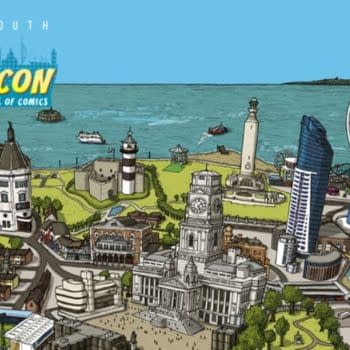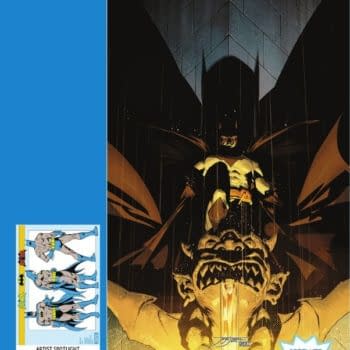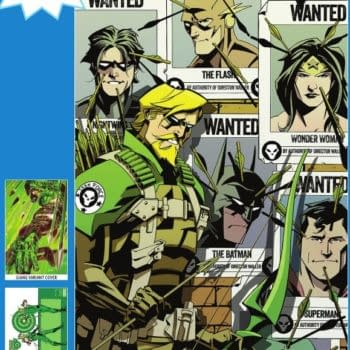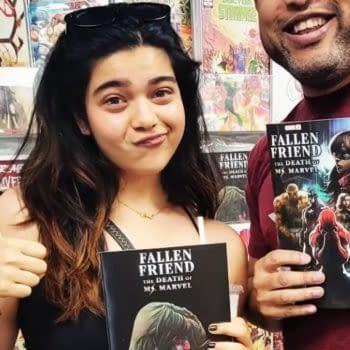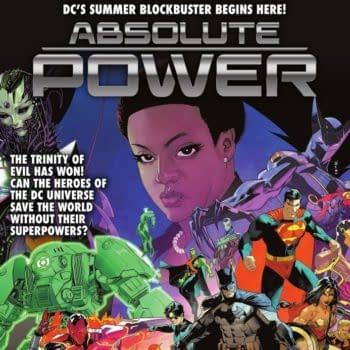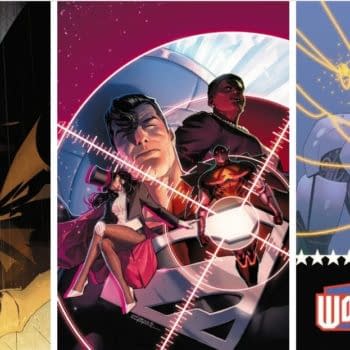Posted in: Comics, Recent Updates | Tagged: chris roberson, Comics, Dennis Culver, digital comics, edison rex, entertainment, monkeybrain, Silver Age Comics
The (Really) Reluctant Hero – Chris Roberson and Dennis Culver Talk Monkeybrain's Edison Rex
By Alasdair Stuart

Alasdair Stuart: For people who've yet to read the book, what's it's premise?
Chris Roberson: Essentially, Edison Rex is the greatest criminal genius in the world, and the archnemesis of the world's greatest hero. But when Rex manages at long last to eliminate the hero, he realizes that there is no one left to defend the Earth, and decides that he's the only one suited to the job. But he has to figure out how to do that, while convincing the rest of the world that he's not still a criminal along the way.
Dennis Culver: Broadly, Rex is that guy that always talks about how great he would be if it wasn't for that one person in his way having to live up that promise. It's not as easy as he thought it would be.
AS: What sort of tone are you aiming for with it?
CR: The book isn't a parody or satire, but there is some humor in it. But everything is played absolutely straight, and there are some very serious and emotional moments that happen along the way. I suppose you could say that we're aiming for a somewhat lighter touch than most mainstream superhero comics these days employ, while at the same time telling stories that are meant to be taken seriously.
DC: We have far less carnage than modern superhero books but we make up for that with lots more imagination.
AS: What influenced the book?
CR: The biggest influences were the comics that Dennis and I read growing up, most definitely. But we've also been influenced by comics like Art Adams's Monkeyman & O'Brien, Kurt Busiek and Brent Anderson's Astro City, and Alan Moore and Chris Sprouse's Tom Strong, and cartoons like Venture Bros. and Batman: The Brave and The Bold. Those are the ones that spring most readily to my mind. Dennis, what about you?
DC: 80's superhero comics. Bruce Timm DCAU. The animated Young Justice stuff was great. I feel we're continuously processing our influences new and old into the book. It's all the things we love about the genre in one comic.
AS: One of the things I love about it is the clear affection you seem to have for not just superheroes, but their history. I'm thinking in particular of the Gladiator Gladstone material. Is there a particular era you're especially fond of?
CR: I'm a bit older than Dennis, and so My Own Personal Golden Age is somewhere between the late 70's and the early 80's, the tail end of the "Bronze Age." It was a time when superhero comics had become a little more sophisticated in terms of the subject matter and storytelling techniques, but hadn't yet become embarrassed about the sillier aspects of the Silver Age stories that immediately preceded those years. So you could find well told, often very layered and nuanced stories that fully embraced all of the wacky, outlandish stuff that had had happened in those characters' backstories just a decade or so before. But at the same time, I still have a lot of fondness for the Golden Age and Silver Age stories, as well, and so we tend to revisit the equivalent eras in Edison's world quite a lot.
DC: Legacy is a strong theme in our book and I think that' a casualty of the constant reboots rampant in a lot of the genre's current work.
AS: We're 12 issues in and Edison has a supporting cast in place and thinks he's starting to change his reputation a little. What's on deck for Edison Rex: Year 2?
CR: Well, at the end of these first dozen issues, Edison Rex seems to think that he's getting matters in hand, and that he's starting to get the hang of this "defending the Earth" business. He is soon going to learn that he's not nearly as good at it as he thinks he is.
DC: My answer for questions like this is always "Actions have consequences".
AS: You've got a rich, varied and interesting supporting cast in the book. Were they a team effort to create?
CR: Everything about the book has been a team effort, actually. Which is why the credits have been changed so that they now read "Story by Chris Roberson & Dennis Culver," and then "Script" by me and "Art" by Dennis. Because we really do collaborate on every stage of the process. The stories themselves come about from conversation we have about what might happen next, and then one or the other of us writes out a quick plot synopsis, that the other tweaks, and so on. I take all of that and come up with a plot outline, which Dennis revises, and so on, until we've got something we're happy with. Then I do a script, with the panel shapes and sizes indicated in the script, and Dennis revises that, then begins to do layouts. And so on. In terms of the supporting cast, and the various heroes and villains that Rex encounters, we typically start with a kind of "ecological niche" that needs filling, and then build up from there.
DC: Nothing is coming from one place. Sometimes Chris will dig up one of my old drawings on my tumblr and that inspires a character or story idea. Sometimes Chris will add a line spur of the moment in a Rexfile that I riff off of that leads to a new character or story idea. Edison Rex is a true co-creation. As far as I'm concerned it's the ideal way to make comics.
AS: The sense of humor the book has is lovely, balancing long-suffering character humor with moments of real sweetness and very real darkness. Did that evolve over time or is it something that you planned coming in?
CR: I originally imagined that the book would have a darker, more cynical tone to it. But as soon as Dennis and I started working together, this lighter tone just started to emerge. And a lot of the humor wasn't planned, either, but emerged organically through our revision process. So yeah, definitely something that evolved over time.
DC: Yeah it's just the natural byproduct of our collaboration.
AS: How long is the book planned to run?
CR: We've got an end point in mind for Edison's story, but we won't be getting there for a long time to come.
DC: Not only that, we could conceivably spend the rest of our lives telling stories in this universe. We've already created dozens of characters with their own histories and stories so who knows what might unfold or where inspiration will take us!
AS: Going back to the supporting cast for a moment, are there any plans for spin-offs focusing on them?
CR: Dennis and I have talked about various ways we could do stories focusing on some of the other characters, both under the umbrella of the Edison Rex title and as other things. I imagine we will do that sort of thing, sooner or later.
DC: I think there are some logical one that will come up as we get deeper into Rex's story but like I said we could probably spend years on someone like The Eclipse alone.
AS: How has the book changed between planning and execution? Has anything been left on the cutting room floor?
CR: Oh, there have been MANY times when the initial idea for a story didn't resemble the finished product in the slightest. I mean, I'm sure that Dennis and I can still see the "bones" of the original idea in there, but the meat and muscle that gets layered up over it during our collaborative process often results in something that is completely different looking from where we started. But we're like Plains Indians and the buffalo, nothing is ever wasted, nothing discarded. If there's an idea for a character or a situation or setting that ends up not fitting the story at hand, it just goes back in the hopper to be used at some other point further down the road.
DC: We make each other's ideas better. There are things we've done that neither of us would have come up with on our own and I imagine that pattern will continue as the story moves forward.
AS: Chris, what's your scripting style for this? The book feels very, for want of a better word, spacious, there's lots of room for the script and art to breathe.
CRS: As I mentioned, Dennis and I collaborate on all the details of a story before I ever start writing the script. And so when it comes time for me to sit down and start typing everything up, I always concentrate on the visuals to begin with. Comics are a visual medium, after all, and I think too often scripters can forget to let the artist do their job. I prefer to let the visuals carry as much of the storytelling weight as they can, and the only words that I layer in, whether as dialogue or narrative captions, is simply to fill in the gaps that the art might not be able to convey on its own.
AS: Chris, is there a particular character you've found has demanded more page time as you've written them?
CR: They've all surprised me in one way or another, but I suppose Larva was the biggest surprise. Dennis and I had discussed her personality in generic terms very early on, as he was designing her monstrous appearance, but as soon as she started talking she turned into a much chattier, much more flirtatious character than I'd anticipated. But we've simply incorporated that into her personality and her actions as we've gone along, to the point where it's actually driving some of the plotlines that we're starting to put into motion.
AS: Dennis, you have this incredible, clean, detailed style that, like the scripts, feels very relaxed and unforced. How did that evolve?
DC: It's a product of my influences certainly, and just figuring things out as I go along. I feel like I'm constantly refining my style and way of doing things. I plan to keep getting better and better!
AS: One of my favorite things about the book is Edison's technology, which seems to be equal parts '60s Fantastic Four and Venture Bros. What's your design philosophy for his tech?
DC: A lot of the Timm era DCAU animation. They tended towards a simplified Kirbytech aesthetic that really resonates with me and I try to shoot for that with my own spin on it.
Thanks to Chris and Dennis for talking to me. It's a great book, crackling with energy and pure pulp joy and the first dozen issues are available now at Comixology at $.99 each. The rest of Monkeybrain's line is also ridiculously good, and can be found here.
Alasdair Stuart is a freelance writer who also podcasts, designs roleplaying games and is an enthusiastically amateur baker and martial artist. Some day he'll figure out how to combine all of them. He's on twitter @AlasdairStuart now, trying to figure out how.












